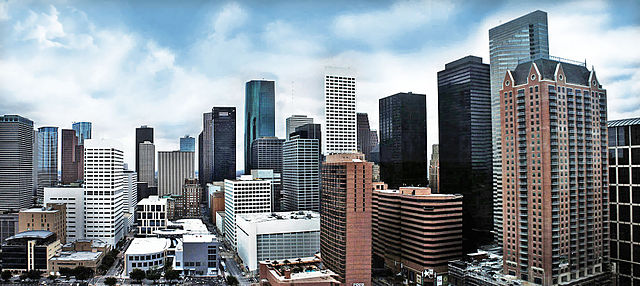Houston CultureMap contributor Barbara Kuntz collected all the project proposals the website covered in 2014 and recapped four daring developments that could alter the cultural landscape in Bayou City:
A New Swimming Hot Spot
In December, three entrepreneurs proposed a natural public swimming pool in Houston, Kuntz reports. Today, the project already has more than 270 backers making pledges on the project’s Kickstarter page. The project is also receiving support from civic leaders and organizations, including the Buffalo Bayou Partnership, the Greater East End District, the city of Houston Sustainability Office, and the Shell Center for Sustainability at Rice University.
Grand Texas: The Lone Star State’s New Entertainment District
Back in 2013, developer Monty Galland announced that the Grand Texas theme park is just a single component of a larger plan that involves 450,000 sf for retail, dining, an RV area, and a 6,000-seat stadium for minor league baseball games. As of last fall, bulldozers have started clearing out space on the site along Highway 59. By 2020, officials expect 4.5 million annual visitors to this theme park district.
Farming in the Astrodome
The Urban Land Institute presented what Kuntz called an “ambitious plan” to repurpose the iconic stadium after Houston voters rejected a $217 million bond to transform it into a special events center. This plan involves constructing an oak-lined promenade from the METRO light rail station to the Astrodome, where the space could be used for functions including a park, sustainable farm, farmer’s market, festivals, and museums. The dome’s top area would include a vieweing area with zip-lining, hike-and-bike trails, and indoor rock climbing.
Memorial Park Long-Range Master Plan
This April, the final design for Houston’s Memorial Park goes before the Houston city council for consideration. The so-called Long-Range Master Plan by Thomas Woltz, principal with Nelson Byrd Woltz Landscape Architects, highlights updates from public input, such as 8.5 miles of mountain bike trails and 17 miles of paved walkways for bikers and pedestrians.
Related Stories
Museums | Aug 11, 2010
Design guidelines for museums, archives, and art storage facilities
This column diagnoses the three most common moisture challenges with museums, archives, and art storage facilities and provides design guidance on how to avoid them.
| Aug 11, 2010
Broadway-style theater headed to Kentucky
One of Kentucky's largest performing arts venues should open in 2011—that's when construction is expected to wrap up on Eastern Kentucky University's Business & Technology Center for Performing Arts. The 93,000-sf Broadway-caliber theater will seat 2,000 audience members and have a 60×24-foot stage proscenium and a fly loft.
| Aug 11, 2010
Citizenship building in Texas targets LEED Silver
The Department of Homeland Security's new U.S. Citizenship and Immigration Services facility in Irving, Texas, was designed by 4240 Architecture and developed by JDL Castle Corporation. The focal point of the two-story, 56,000-sf building is the double-height, glass-walled Ceremony Room where new citizens take the oath.
| Aug 11, 2010
Carpenters' union helping build its own headquarters
The New England Regional Council of Carpenters headquarters in Dorchester, Mass., is taking shape within a 1940s industrial building. The Building Team of ADD Inc., RDK Engineers, Suffolk Construction, and the carpenters' Joint Apprenticeship Training Committee, is giving the old facility a modern makeover by converting the existing two-story structure into a three-story, 75,000-sf, LEED-certif...
| Aug 11, 2010
Utah research facility reflects Native American architecture
A $130 million research facility is being built at University of Utah's Salt Lake City campus. The James L. Sorenson Molecular Biotechnology Building—a USTAR Innovation Center—is being designed by the Atlanta office of Lord Aeck & Sargent, in association with Salt-Lake City-based Architectural Nexus.
| Aug 11, 2010
San Bernardino health center doubles in size
Temecula, Calif.-based EDGE was awarded the contract for California State University San Bernardino's health center renovation and expansion. The two-phase, $4 million project was designed by RSK Associates, San Francisco, and includes an 11,000-sf, tilt-up concrete expansion—which doubles the size of the facility—and site and infrastructure work.
| Aug 11, 2010
Goettsch Partners wins design competition for Soochow Securities HQ in China
Chicago-based Goettsch Partners has been selected to design the Soochow Securities Headquarters, the new office and stock exchange building for Soochow Securities Co. Ltd. The 21-story, 441,300-sf project includes 344,400 sf of office space, an 86,100-sf stock exchange, classrooms, and underground parking.
| Aug 11, 2010
New hospital expands Idaho healthcare options
Ascension Group Architects, Arlington, Texas, is designing a $150 million replacement hospital for Portneuf Medical Center in Pocatello, Idaho. An existing facility will be renovated as part of the project. The new six-story, 320-000-sf complex will house 187 beds, along with an intensive care unit, a cardiovascular care unit, pediatrics, psychiatry, surgical suites, rehabilitation clinic, and ...
| Aug 11, 2010
Colonnade fixes setback problem in Brooklyn condo project
The New York firm Scarano Architects was brought in by the developers of Olive Park condominiums in the Williamsburg section of Brooklyn to bring the facility up to code after frame out was completed. The architects designed colonnades along the building's perimeter to create the 15-foot setback required by the New York City Planning Commission.








